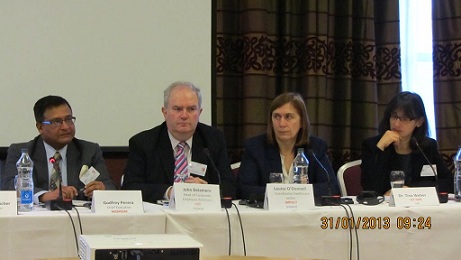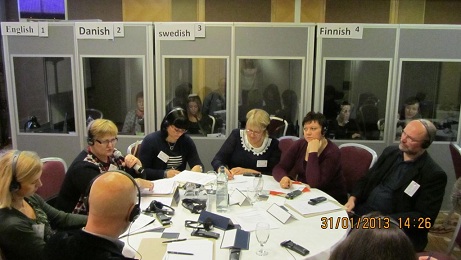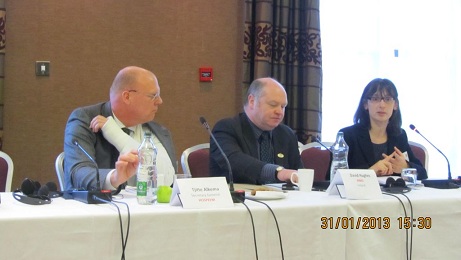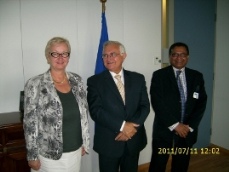Report 1st Regional Seminar Dublin 31 January 2013
Brussels, 5 February 2013
Joint EPSU-HOSPEEM Project “Promotion and support of the implementation of Directive 2010/32/EU on the prevention of sharps injuries in the hospital and health care sector”
Regional Seminar 1 – Dublin, 31 January 2013

Godfrey Perera, Chief Executive, HOSPEEM ; John Delamere, Head of Corporate Employee Relations, HSE ; Louise O’Donnell, Coordinator Healthcare Sector, IMPACT ; Tina Weber, ICF GHK (from left to right) during the opening plenary session
The first regional seminar with about 90 participants from 10 European countries (Belgium, Denmark, Finland, Iceland, Ireland, Latvia, Lithuania, the Netherlands, Sweden and the United Kingdom) invited to attend the event took place on 31 January 2013 in Dublin. It was jointly hosted by the Health Service Executive (HSE) representing the Irish hospital employers and IMPACT for the trade union side and organised by HOSPEEM and EPSU.
FINAL agenda (as of 24 January 2013) – in EN only
![]() FINAL Agenda Seminar (as of 24 January 2013) – in EN only
FINAL Agenda Seminar (as of 24 January 2013) – in EN only

Impression from a working group with colleagues from Finland, Lithuania, The Netherlands and Sweden
An article has been written by the HOSPEEM Secretariat that you can read in the file below and soon on HOSPEEM’s homepage.
![]() Regional Seminar 1 Dublin Press Release HOSPEEM (05.02.13)
Regional Seminar 1 Dublin Press Release HOSPEEM (05.02.13)
Read the report of the regional seminar, drafted by ICF GHK (Dr. Tina Weber) – in EN, FR and DE.
a) in EN
![]() Regional Seminar 1 Dublin Report ICF GHK (Tina Weber) – EN
Regional Seminar 1 Dublin Report ICF GHK (Tina Weber) – EN
b) in FR
![]() Regional Seminar 1 Dublin Report ICF GHK (Tina Weber) – FR
Regional Seminar 1 Dublin Report ICF GHK (Tina Weber) – FR
c) in DE
![]() Regional Seminar 1 Dublin Report ICF GHK (Tina Weber) – DE
Regional Seminar 1 Dublin Report ICF GHK (Tina Weber) – DE
We have uploaded below the slide sets (mostly in EN) to accompany the presentations given at the seminar.
Presentations
Provisional results of EPSU-HOSPEEM Survey on the state of the art of the use and implementation of Directive 2010/32/EU and the role of the social partners in the transposition of EU-legislation into national rules (Dr. Tina Weber, ICF GHK)
![]() Presentation Weber – EN
Presentation Weber – EN
Finland
Irmeli Vuoriluoto, Union of Health and Social Care Professionals (Tehy), Helsinki
![]() Presentation Vuoriluoto – EN
Presentation Vuoriluoto – EN
Ireland
1) Esther Lynch, Irish Congress of Trade Unions (ICTU), Dublin
![]() Presentation Lynch – EN
Presentation Lynch – EN
2) Dr. Blánaid Hayes, Beaumont Hospital, Dublin
![]() Presentation Hayes – EN
Presentation Hayes – EN
Lithuania
Živilė Mikalauskienė & Genovaitė Milošienė, Lithuanian Trade Union of Health Care Employees (LSADPS), Vilnius
![]() Presentation Mikalauskiene & Milosiene – LT + EN
Presentation Mikalauskiene & Milosiene – LT + EN
The Netherlands
Dr. Paul Van Wijk, Vrije Universiteit Medical Center, Amsterdam
a) in EN
![]() Presentation van Wijk – EN
Presentation van Wijk – EN
b) in NL
![]() Presentation van Wijk – NL
Presentation van Wijk – NL
Sweden
Prof. Dr. Ann-Beth Antonsson, Swedish Environmental Research Institute, Stockholm
![]() Presentation Antonsson – EN
Presentation Antonsson – EN
Further reading :
Study on the prevention from injuries with sharps injuries (in SV)
a) Summary in EN
![]() Summary Information IVN Study Sharps Injuries – EN
Summary Information IVN Study Sharps Injuries – EN
b) Detailed information in SV
Stick- och skärskador inom hälso- och sjukvården – Förebyggande insatser för skador och smitta pga. vassa instrument
United Kingdom
Kim Sunley, Royal College of Nursing (RCN) / Ann Stansfield (Peterborough City Hospital) / Robert Baughan (UNISON), London / Peterborough
![]() Presentation Sunley & Stansfield & Baughan – EN
Presentation Sunley & Stansfield & Baughan – EN

Tjitte Alkema, Secretary General, HOSPEEM ; David Hughes, Deputy General Secretary, INMO ; Tina Weber, ICF GHK (from left to right) during the closing panel
You’ll find below a the file a short presentation of HOSPEEM and EPSUincluding a summary of the activities and outcomes of the sectoral social dialogue committee in the hospital and health care sector in 2012.
![]() Presentation HOSPEEM & EPSU + Activities & Outcomes 2012 SSDC HS
Presentation HOSPEEM & EPSU + Activities & Outcomes 2012 SSDC HS
 This project has received funding from the European Commission
This project has received funding from the European Commission
![]() Regional Seminar 1 Dublin Report ICF GHK (Tina Weber) – FR
Regional Seminar 1 Dublin Report ICF GHK (Tina Weber) – FR




Recent Comments